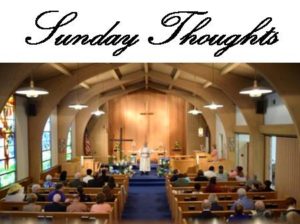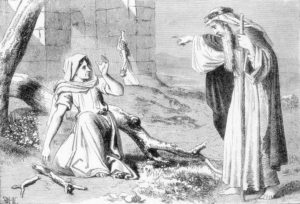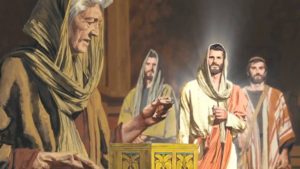 The Lord be with you
The Lord be with you
This coming Sunday will be November 11 and Veterans’ Day on the civil calendar. On the liturgical calendar it will be Pentecost 25 and the Commemoration of Martin of Tours, Pastor. I assume everyone knows about Veterans’ Day and maybe its background, but fewer know about Martin of Tours, so I’m beginning these thoughts with some background about him.
Martin was born into a pagan family around the year 316 in what is now a part of Hungary. His father was a Roman legionary. He spent his boyhood in Pavia in Lombardy where he came under Christian influence, and at the age of ten he decided on his own to become a catechumen. When he was fifteen, being the son of a soldier, he was drafted to serve in the army. He was apparently a good soldier and popular with his comrades.
 According to a very old legend, one winter night when he was stationed in Amiens, Martin saw a poor old beggar at the city gate shivering in the cold. Having nothing to give him, Martin took his sword and cut his cavalryman’s cloak in two and gave half to the man. The next night Martin dreamed of Christ in heaven wearing his half-cloak and saying, “Martin, still a catechumen, has covered me with his cloak.”
According to a very old legend, one winter night when he was stationed in Amiens, Martin saw a poor old beggar at the city gate shivering in the cold. Having nothing to give him, Martin took his sword and cut his cavalryman’s cloak in two and gave half to the man. The next night Martin dreamed of Christ in heaven wearing his half-cloak and saying, “Martin, still a catechumen, has covered me with his cloak.”
As time passed, the young soldier found it increasingly difficult to combine his own ideal of a Christian life with the duties of military service. Eventually, he decided to be baptized and asked to leave the army, since he was no longer willing to kill. He was released when he was twenty.
He attached himself to Bishop Hilary of Poitiers, however first he returned home to share the gospel with his family and friends. On his way back to Hilary, he learned that the bishop had been exiled by the Arians, and instead of going on to Gall, he stayed a while in Milan and then went to an island where he lived a hermit’s life until Hilary was restored to his see.
Martin spent the next ten years in a hut outside the city of Poitiers. Here he was joined by others until the settlement became, in effect, a monastery and the center of charitable work and missionary activity. This is considered the first French monastery and the beginning of the expansion of the monastic movement which began in Egypt. People from the surrounding countryside came to St. Martin for help, and in 371, when the see of Tours became vacant, they got him to the city by a ruse and then insisted that he become their bishop. He finally agreed, but only after the people agreed that he could maintain his monastic life-style.
So, Bishop Martin lived in a cave in the cliffs of Marmoutier, two miles from Tours. His office space for the work of the diocese was a hut nearby. The new bishop’s way of life was quite different from that of his fellow bishops in other cities, which led to some friction there, but he succeeded in establishing Christianity in rural areas of Gall; previously it had been limited mostly to the cities. He traveled all over his vast diocese carrying the gospel to peasants and tribes-people. A champion of the biblical doctrines of the Trinity and the Divine and human natures of Jesus, he contended against paganism and Arianism while setting up centers of Christian life and faith. He also did not hesitate to speak forcefully to emperors on behalf of the people, but basically he was a gentle and peace-loving man. During the Priscillianist controversies in Spain and Gall (Priscillian, charged with practicing magic, was executed by Emperor Maxmillian in 386, the first instance of capital punishment for heresy in the history of the Church), Martin strongly opposed the death sentence imposed by the government for heresy and raised important questions concerning the relations between Church and state.
Martin died November 8, 397, in a distant outpost of his diocese, and the date of his commemoration recalls the day of his burial at Tours.
Another little tidbit about Martin of Tours is that, during the Middle Ages, the relic of St. Martin’s cloak, (cappa Sancti Martini), conserved at the Marmoutier Abbey, near to Tours, became one of the most sacred relics of the Frankish kings. It would be carried everywhere the king went, even into battle, as a holy relic upon which oaths were sworn. The cloak is first attested in the royal treasury in 679, when it was conserved at the palatium of Luzarches, a royal villa that was later ceded to the monks of Saint-Denis by Charlemagne, in 798/99. The priest who cared for the cloak in its reliquary was called a cappellanu, and ultimately all priests who served the military were called cappellani. The French translation is chapelains, which is where the English word, “chaplain” is derived. One of the many services a chaplain can provide is spiritual and pastoral support for military service personnel by performing religious services at sea or in the battlefield.
We will remember this commemoration in our prayers Sunday.
For our liturgy, we will be using Matins. Our readings will be Psalm 146, 1 Kings 17:8–16, Hebrews 9:24–28, and Mark 12:38–44. Our opening hymn is a bit long so we will sing it twice, verses 1-3 for our opening hymn and verses 4-6 for our sermon hymn. It is “All Depends on Our Possessing” (LSB 732). Our closing hymn will be “Lord of All Hopefulness” (LSB 738).The text for our sermon is taken from the Psalm of the Day and is Psalm 146:5. The sermon is titled, “Trust the Lord.”
We continue to make great progress singing through the hymnal and all who are interested are welcome to join the group that will be meeting after worship this Sunday. We will begin with “For Me to Live Is Jesus” (LSB 742). After we sing a verse, a quick poll it taken of the singers asking if they know the hymn or not. If everyone, or most everyone, knows the hymn, it is marked “well know.” If only about half of us know the hymn, it is marked “known.” If no one, or only a few of us, knows the hymn, it is marked “unknown.” For all hymns that are marked “unknown,” a follow-up question is asked, “Should we learn the hymn.” This list is used to help pick the hymns we sing on Sunday.
Below are the lessons for Sunday with a few initial thoughts from me.
Psalm 146 (9a)
The LORD watches over the sojourners;
he upholds the widow and the fatherless,
1 Praise the LORD!
Praise the LORD, O my soul!
2 I will praise the LORD as long as I live;
I will sing praises to my God while I have my being.
3 Put not your trust in princes,
in a son of man, in whom there is no salvation.
4 When his breath departs, he returns to the earth;
on that very day his plans perish.
5 Blessed is he whose help is the God of Jacob,
whose hope is in the LORD his God,
6 who made heaven and earth,
the sea, and all that is in them,
who keeps faith forever;
7 who executes justice for the oppressed,
who gives food to the hungry.
The LORD sets the prisoners free;
8 the LORD opens the eyes of the blind.
The LORD lifts up those who are bowed down;
the LORD loves the righteous.
9 The LORD watches over the sojourners;
he upholds the widow and the fatherless,
but the way of the wicked he brings to ruin.
10 The LORD will reign forever,
your God, O Zion, to all generations.
Praise the LORD!
Glory be to …
My initial thoughts:
This Psalm is almost all Gospel, The Law portions being a warning to not trust in “princes” and the warning that the way of the wicked is brought to ruin by God. It is part of the final grouping of Psalms which are all praise Psalms. The Psalmist praises God for many of his merciful acts which inspire us to trust the Lord. The word “Lord” is in all capital letters, indicating that it is a translation of the Hebrew “Yahweh.” “Yahweh” is the personal name of God in the Old Testament. The name of our Lord Jesus means “Yahweh saves.” The “J” in Jesus is the “Y” in Yahweh, just like it is in the name Joshua.
First Reading 1 Kings 17:8–16
 8 Then the word of the LORD came to him [Elijah], 9“Arise, go to Zarephath, which belongs to Sidon, and dwell there. Behold, I have commanded a widow there to feed you.” 10So he arose and went to Zarephath. And when he came to the gate of the city, behold, a widow was there gathering sticks. And he called to her and said, “Bring me a little water in a vessel, that I may drink.” 11And as she was going to bring it, he called to her and said, “Bring me a morsel of bread in your hand.” 12And she said, “As the LORD your God lives, I have nothing baked, only a handful of flour in a jar and a little oil in a jug. And now I am gathering a couple of sticks that I may go in and prepare it for myself and my son, that we may eat it and die.” 13And Elijah said to her, “Do not fear; go and do as you have said. But first make me a little cake of it and bring it to me, and afterward make something for yourself and your son. 14For thus says the LORD, the God of Israel, ‘The jar of flour shall not be spent, and the jug of oil shall not be empty, until the day that the LORD sends rain upon the earth.’” 15And she went and did as Elijah said. And she and he and her household ate for many days. 16The jar of flour was not spent, neither did the jug of oil become empty, according to the word of the LORD that he spoke by Elijah.
8 Then the word of the LORD came to him [Elijah], 9“Arise, go to Zarephath, which belongs to Sidon, and dwell there. Behold, I have commanded a widow there to feed you.” 10So he arose and went to Zarephath. And when he came to the gate of the city, behold, a widow was there gathering sticks. And he called to her and said, “Bring me a little water in a vessel, that I may drink.” 11And as she was going to bring it, he called to her and said, “Bring me a morsel of bread in your hand.” 12And she said, “As the LORD your God lives, I have nothing baked, only a handful of flour in a jar and a little oil in a jug. And now I am gathering a couple of sticks that I may go in and prepare it for myself and my son, that we may eat it and die.” 13And Elijah said to her, “Do not fear; go and do as you have said. But first make me a little cake of it and bring it to me, and afterward make something for yourself and your son. 14For thus says the LORD, the God of Israel, ‘The jar of flour shall not be spent, and the jug of oil shall not be empty, until the day that the LORD sends rain upon the earth.’” 15And she went and did as Elijah said. And she and he and her household ate for many days. 16The jar of flour was not spent, neither did the jug of oil become empty, according to the word of the LORD that he spoke by Elijah.
My initial thoughts:
This reading is taken from a time that Elijah was in exile. It is part of the story about his interaction with a widow and her son. Israel and the surrounding areas were experiencing a famine brought about, physically, from a lack of rainfall. God held back the rain because of Israel’s apostasy, sponsored by the king and queen. In such times widows and orphans, being among the most venerable in the land, were at greater risk. This widow was part of a nation that believed in many gods. She had no problem believing that Yahweh was real, she just didn’t believe that he was her God. Why would the God of Israel care for her? She was not an Israelite. Anyway, the Lord does care for her and her son through the prophet. In the end (not included in this reading) she comes to faith in the One True God. The story especially highlights the thoughts in the Psalm about not trusting “princes,” God’s merciful care for widows and orphans, God’s care for sojourners (Elijah), and God as creator (not only in the background of the drought but also in the creation of the food for Elijah, widow and son), which also accents the Psalm’s phrase, “who gives food to the hungry.”
Epistle Hebrews 9:24–28
24For Christ has entered, not into holy places made with hands, which are copies of the true things, but into heaven itself, now to appear in the presence of God on our behalf. 25Nor was it to offer himself repeatedly, as the high priest enters the holy places every year with blood not his own, 26for then he would have had to suffer repeatedly since the foundation of the world. But as it is, he has appeared once for all at the end of the ages to put away sin by the sacrifice of himself. 27And just as it is appointed for man to die once, and after that comes judgment, 28so Christ, having been offered once to bear the sins of many, will appear a second time, not to deal with sin but to save those who are eagerly waiting for him.
My initial thoughts:
The writer of Hebrews continues to demonstrate the superiority of Jesus over the Old Testament worship system by showing how Jesus is the fulfillment of the Old Testament. Jesus enters heaven whereas the temple the High Priest entered was simply a copy of heaven. Jesus is sacrificed once while the sacrifices of the Old Testament must be repeated time and time again. Jesus appeared once during these latter times and will appear once again at the end of time, not to deal with sin but to bring to himself in heaven all who believe in him. If one wished to relate this to the Psalm, one need only notice that all the merciful acts of Jesus lead us to trust the Lord and sing his praise.
 Gospel Mark 12:38–44
Gospel Mark 12:38–44
8 And in his teaching he said, “Beware of the scribes, who like to walk around in long robes and like greetings in the marketplaces 39and have the best seats in the synagogues and the places of honor at feasts, 40who devour widows’ houses and for a pretense make long prayers. They will receive the greater condemnation.”
41 And he sat down opposite the treasury and watched the people putting money into the offering box. Many rich people put in large sums. 42And a poor widow came and put in two small copper coins, which make a penny. 43And he called his disciples to him and said to them, “Truly, I say to you, this poor widow has put in more than all those who are contributing to the offering box. 44For they all contributed out of their abundance, but she out of her poverty has put in everything she had, all she had to live on.”
My initial thoughts:
In the first half of this lesson, we see that a good show does not fool God. We see the scribes acting in a fashion completely opposite of God as described in our Psalm. In the second half of the reading, we find Jesus favorably commenting on a poor widow who put one penny in the offering box. Though many gave much more, the widowed is singled out as being the truly generous giver in God’s eyes. This reading could, of course, make a good sermon on stewardship as pledge Sunday approaches, which it does for us. If one wants to relate the reading to the Psalm, one need only notice that you cannot identify true believers by their temporal success (the Psalm’s accent on oppressed people).
May this look ahead help us prepare for our Sunday worship.
Blessings in Christ,
Pastor
